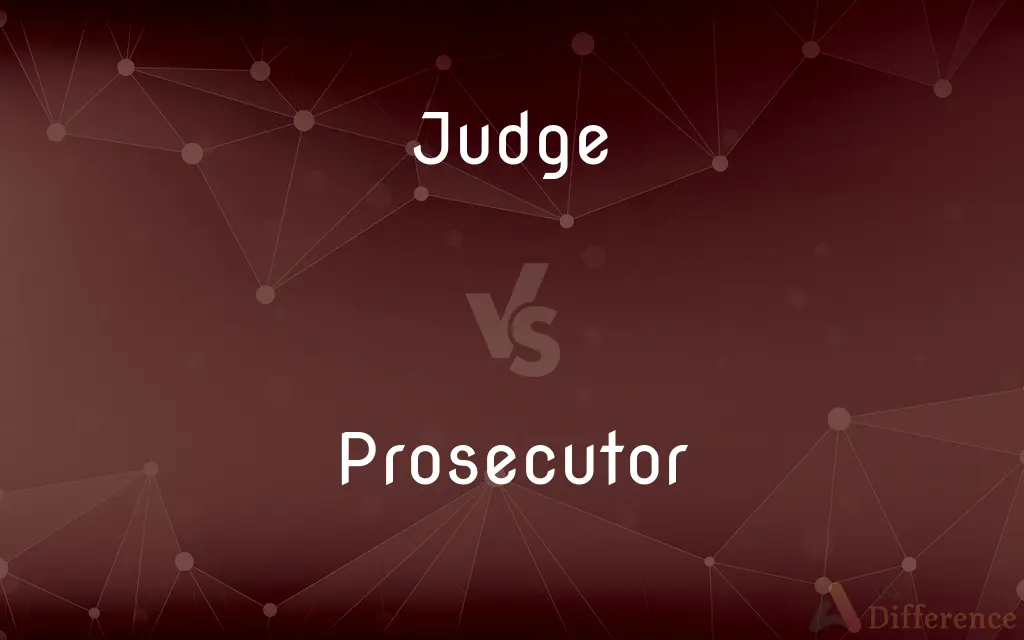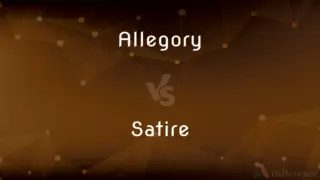Judge vs. Prosecutor — What's the Difference?
By Tayyaba Rehman — Updated on October 6, 2023
Judge is a person qualified to decide on legal matters in court. Prosecutor is a lawyer who conducts the case against a defendant. The judge impartially administers the law, while the prosecutor seeks to prove the defendant’s guilt.

Difference Between Judge and Prosecutor
Table of Contents
ADVERTISEMENT
Key Differences
A judge serves as an impartial entity, crucially devoid of any alliance in a court case, ensuring equitable proceedings. On the contrary, a prosecutor distinctly aligns with the prosecution, ardently working to establish the defendant's guilt, hence playing a biased role.
Judges, in their pivotal role, are tasked with ensuring that trials are conducted fairly, adhering rigorously to legal guidelines. Prosecutors, while also adhering to legal guidelines, aim to validate the guilt of the accused by presenting substantiating evidence and arguments.
In most jurisdictions, the judge is essentially a neutral party, rendering decisions or verdicts based on presented facts and applicable laws. Conversely, prosecutors navigate through the legal process with a clear objective of affirming the defendant's guilt through strategic legal means.
Judges are usually tasked with determining the applicable legal ramifications, penalties, or sentences upon a defendant’s guilt establishment. Conversely, prosecutors work to influence such outcomes by demonstrating the depth and severity of the defendant's unlawful actions.
The role of a judge demands a consistent demeanor of impartiality and neutrality throughout the legal process. Meanwhile, a prosecutor engages proactively, often showcasing emotion and passion, to ascertain the defendant’s guilt in the face of legal scrutiny.
ADVERTISEMENT
Comparison Chart
Role Orientation
Neutral
Biased towards proving guilt
Primary Goal
Fair trial adherence
Prove defendant's guilt
Legal Alignment
Impartial
Aligned with prosecution
Interaction in Court
Oversees proceedings
Actively argues case
Decision Making
Determines verdict/penalty
Influences through argumentation
Compare with Definitions
Judge
(Law) To hear and decide on in a court of law
Judge a case.
Prosecutor
A prosecutor aims to prove the defendant’s guilt.
The prosecutor presented compelling evidence.
Judge
A judge is an official who presides over a court.
The judge ruled in favor of the defendant.
Prosecutor
Prosecutors engage actively in court arguments.
The prosecutor passionately argued the case.
Judge
A judge is a person who presides over court proceedings, either alone or as a part of a panel of judges. The powers, functions, method of appointment, discipline, and training of judges vary widely across different jurisdictions.
Prosecutor
A prosecutor presents evidence against the defendant.
The prosecutor outlined the facts meticulously.
Judge
To form an opinion or estimation of after careful consideration
Judge heights.
Judging character.
Prosecutor
Prosecutors can negotiate plea deals with defense.
The prosecutor offered a reduced sentence for a guilty plea.
Judge
To pass sentence on; condemn.
Prosecutor
Prosecutors represent the government in trial.
The prosecutor argued for the state’s interests.
Judge
To act as one appointed to decide the winners of
Judge an essay contest.
Prosecutor
A prosecutor is a legal representative of the prosecution in countries with either the common law adversarial system or the civil law inquisitorial system. The prosecution is the legal party responsible for presenting the case in a criminal trial against an individual accused of breaking the law.
Judge
To determine or declare after consideration or deliberation
Most people judged him negligent in performing his duties as a parent.
Prosecutor
One that prosecutes.
Judge
(Informal) To have as an opinion or assumption; suppose
I judge you're right.
Prosecutor
One that initiates and carries out a legal action, especially criminal proceedings.
Judge
(Bible) To govern; rule. Used of an ancient Israelite leader.
Prosecutor
See prosecuting attorney.
Judge
To form an opinion or evaluation.
Prosecutor
(law) a prosecuting attorney.
Annie Jay was the Wisconsin government prosecutor in the trial of a man for forging his client's signature.
Judge
To act or decide as a judge.
Prosecutor
(law) a person, as a complainant, victim, or chief witness, who institutes prosecution in a criminal proceeding.
The prosecutor got the witness to admit he was lying.
Judge
One who makes estimates as to worth, quality, or fitness
A good judge of used cars.
A poor judge of character.
Prosecutor
One who prosecutes or carries on any purpose, plan, or business.
Judge
(Law) A public official who hears and decides cases brought in court.
Prosecutor
The person who institutes and carries on a criminal suit against another in the name of the government.
Judge
(Law) A public official who hears and decides cases or matters in a forum other than a court, such as an administrative proceeding.
Prosecutor
A government official who conducts criminal prosecutions on behalf of the state
Judge
One appointed to decide the winners of a contest or competition.
Judge
A leader of the Israelites during a period of about 400 years between the death of Joshua and the accession of Saul.
Judge
Judges (used with a sing. verb) See Table at Bible.
Judge
A public official whose duty it is to administer the law, especially by presiding over trials and rendering judgments; a justice.
Judge
A person who decides the fate of someone or something that has been called into question.
Judge
A person officiating at a sports event, a contest, or similar.
At a boxing match, the decision of the judges is final.
Judge
A person who evaluates something or forms an opinion.
She is a good judge of wine.
They say he is a poor judge of character considering all the unreliable friends he has made.
Judge
A shophet, a temporary leader appointed in times of crisis in ancient Israel.
Judge
(transitive) To sit in judgment on; to pass sentence on (a person or matter).
A higher power will judge you after you are dead.
Judge
(intransitive) To sit in judgment, to act as judge.
Justices in this country judge without appeal.
Judge
(transitive) To judicially rule or determine.
Judge
To sentence to punishment, to judicially condemn.
He was judged to die for his crimes.
Judge
To award judicially; to adjudge.
Judge
(transitive) To form an opinion on; to appraise.
I judge a man’s character by the cut of his suit.
Judge
To constitute a fitting appraisal or criterion of; to provide a basis for forming an opinion on.
Judge
(intransitive) To arbitrate; to pass opinion on something, especially to settle a dispute etc.
We cannot both be right: you must judge between us.
Judge
(transitive) To have as an opinion; to consider, suppose.
I judge it safe to leave the house once again.
Judge
(ambitransitive) To form an opinion; to infer.
I judge from the sky that it might rain later.
Judge
(ambitransitive) To criticize or label another person or thing.
Judge
(ambitransitive) To govern as biblical judge or shophet (over some jurisdiction).
Judge
A public officer who is invested with authority to hear and determine litigated causes, and to administer justice between parties in courts held for that purpose.
The parts of a judge in hearing are four: to direct the evidence; to moderate length, repetition, or impertinency of speech; to recapitulate, select, and collate the material points of that which hath been said; and to give the rule or sentence.
Judge
One who has skill, knowledge, or experience, sufficient to decide on the merits of a question, or on the quality or value of anything; one who discerns properties or relations with skill and readiness; a connoisseur; an expert; a critic.
A man who is no judge of law may be a good judge of poetry, or eloquence, or of the merits of a painting.
Judge
A person appointed to decide in a trial of skill, speed, etc., between two or more parties; an umpire; as, a judge in a horse race.
Judge
One of the supreme magistrates, with both civil and military powers, who governed Israel for more than four hundred years.
Judge
The title of the seventh book of the Old Testament; the Book of Judges.
Judge
To hear and determine, as in causes on trial; to decide as a judge; to give judgment; to pass sentence.
The Lord judge between thee and me.
Father, who art judgeOf all things made, and judgest only right!
Judge
To compare facts or ideas, and perceive their relations and attributes, and thus distinguish truth from falsehood; to determine; to discern; to distinguish; to form an opinion about.
Judge not according to the appearance.
She is wise if I can judge of her.
Judge
To hear and determine by authority, as a case before a court, or a controversy between two parties.
Judge
To examine and pass sentence on; to try; to doom.
God shall judge the righteous and the wicked.
To bring my whole cause 'fore his holiness,And to be judged by him.
Judge
To arrogate judicial authority over; to sit in judgment upon; to be censorious toward.
Judge not, that ye be not judged.
Judge
To determine upon or deliberation; to esteem; to think; to reckon.
If ye have judged me to be faithful to the Lord.
Judge
To exercise the functions of a magistrate over; to govern.
Make us a king to judge us.
Judge
A public official authorized to decide questions bought before a court of justice
Judge
An authority who is able to estimate worth or quality
Judge
Determine the result of (a competition)
Judge
Form an opinion of or pass judgment on;
I cannot judge some works of modern art
Judge
Judge tentatively or form an estimate of (quantities or time);
I estimate this chicken to weigh three pounds
Judge
Pronounce judgment on;
They labeled him unfit to work here
Judge
Put on trial or hear a case and sit as the judge at the trial of;
The football star was tried for the murder of his wife
The judge tried both father and son in separate trials
Judge
Judges ensure trials adhere to legal norms.
The judge disallowed the inadmissible evidence.
Judge
Judges typically remain neutral in proceedings.
The judge maintained impartiality throughout the trial.
Judge
A judge can determine and impose legal penalties.
The judge sentenced the defendant to five years in prison.
Judge
Judges interpret and apply relevant laws.
The judge referenced previous case laws during the trial.
Common Curiosities
What does a prosecutor do?
A prosecutor presents evidence and arguments to prove the defendant’s guilt.
What is the main role of a judge?
A judge presides over trials ensuring legal adherence and impartiality.
Are prosecutors always involved in criminal cases?
Generally, yes. Prosecutors handle criminal cases, presenting evidence to prove the defendant’s guilt beyond a reasonable doubt.
Is a judge allowed to express personal opinions during a trial?
Judges should refrain from expressing personal beliefs or biases during a trial to maintain impartiality.
Is a judge supposed to be neutral?
Yes, judges should maintain neutrality and impartiality in court proceedings.
Is a prosecutor neutral in a trial?
No, prosecutors seek to establish the defendant’s guilt and are not neutral.
Can a judge overturn a jury's verdict?
In rare circumstances, a judge can overturn a jury’s verdict if it is deemed unreasonable based on the presented evidence.
Can a prosecutor be held liable for misconduct?
While prosecutors have broad immunity, egregious misconduct, especially violating a defendant’s constitutional rights, can have consequences.
Are judges involved in pre-trial procedures?
Yes, judges oversee pre-trial motions, resolve legal issues, and ensure that the trial process adheres to legal standards.
What ethical standards must a prosecutor adhere to?
Prosecutors must follow ethical guidelines, including presenting all evidence (even exculpatory), respecting defendants’ rights, and pursuing justice, not merely convictions.
Can a prosecutor dismiss charges against a defendant?
Yes, a prosecutor can decide to dismiss charges if they deem it appropriate, typically due to a lack of evidence or in the interest of justice.
What is the highest-ranking judge in the United States?
The Chief Justice of the United States Supreme Court is the highest-ranking judge in the U.S.
Who does the prosecutor represent in a criminal case?
In a criminal case, the prosecutor represents the government or "the people" and not individual victims.
What influence does public opinion have on judges and prosecutors?
Both judges and prosecutors should execute their duties impartially, uninfluenced by public opinion, adhering to legal principles and facts.
What is a prosecutor’s role in a plea bargain?
A prosecutor negotiates with the defense to reach a plea agreement, often involving reduced charges or sentences in exchange for a guilty plea.
How does a judge determine appropriate sentencing?
Judges consider various factors, like legal guidelines, the defendant's criminal history, and circumstances of the crime, to determine sentencing.
Can a judge intervene in case management?
Yes, judges often play a role in case management, ensuring that cases proceed in a timely and orderly fashion.
Can a prosecutor decide which cases to prosecute?
Yes, prosecutors have discretion in deciding which cases to pursue based on factors like evidence strength and public interest.
How can a judge be removed from their position?
A judge can be removed through various mechanisms, such as impeachment or judicial conduct review boards, depending on the jurisdiction.
Share Your Discovery

Previous Comparison
Expect vs. Hope
Next Comparison
Allegory vs. SatireAuthor Spotlight
Written by
Tayyaba RehmanTayyaba Rehman is a distinguished writer, currently serving as a primary contributor to askdifference.com. As a researcher in semantics and etymology, Tayyaba's passion for the complexity of languages and their distinctions has found a perfect home on the platform. Tayyaba delves into the intricacies of language, distinguishing between commonly confused words and phrases, thereby providing clarity for readers worldwide.















































